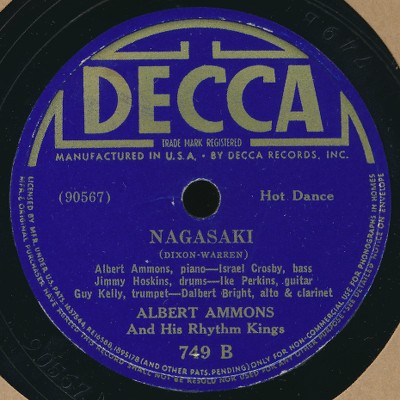For most of the people born and raised in Japan, every August means very special, making them feel very solemn – Nuclear bombing in Hiroshima (Sunday, 8:15 AM, August 6, 1945) and Nagasaki (Thursday, 11:02 AM, August 9, 1945); the end of the World War II aka the Pacific War (Wednesday, August 15, 1945); and coincidentally Aug. 15 is the “Obon” day – Buddist custom to honor the spirits of ancestors. Although I really do know (even as a native Japanese) that there’s been many public debates and controversies around the world relating to the use of nuclear weapons, every August we Japanese renew our determination to attain peace, talking to ourselves we never want to repeat the tragedy.
我々日本人の多くにとって、毎年8月というのは特別な月です。もちろんそれは広島と長崎に原子爆弾が投下され多くの方が犠牲になった月、そして終戦を迎えた月であるからです(また終戦記念日は偶然にもお盆でもあります)。原子爆弾が使用された事実については世界中で賛否両論の議論があるのは知っていますが、日本人にとって毎年8月が特別な気持ちにさせられる月であることは事実であり、悲劇が繰り返されないことを願い、平和を祈念する月でもあります。
“HiroshimaCenotaph 2008 01” by Taisyo – photo taken by Taisyo.
Licensed under CC BY-SA 3.0 via Wikimedia Commons.
On the other hand, some of the Japanese have been enthusiastic about Jazz music for many years (even since before the end of the WWII) – of course I’m one of such Jazz fans for dozens of years. And I sometimes encounter the Jazz/Popular songs that make me feel very confused with mixed emotions. “Hiroshima” by Albert Ammons is one of them.
その一方で、日本人の中には熱狂的なジャズファンが長らくいたわけで、私もその1人なのですが、そんな私がたまに複雑な気持ちにさせられたり、どう受け止めたらいいのかよく分からなくなる、そんなジャズやポピュラーの楽曲に出会うことがあります。アルバート・アモンズ (Albert Ammons) の「Hiroshima」という演奏もそんな曲です。
Albert Ammons And His Rhythm Kings:
Gene Ammons (ts), Albert Ammons (p), Ike Perkins (g), Israel Crosby (b), Al Burroughs (ds).
Recorded in Chicago, IL on August 6, 1947
931-1 S.P. Blues Mercury 8063; Mercury MG 25012; EmArcy EMS 2-400
932-1 Hiroshima Mercury 8063; EmArcy EMS 2-400
The tune entitled “Hiroshima” was recorded on August 6, 1947 – second anniversary of Hiroshima bombing (note: different opinion points out that the recording date was Nov. 12, 1946). On the other hand, this tune is the retitling of “Nagasaki”, a typical Tin Pan Alley song and Jazz standard tune composed way back in 1928 by Harry Warren and Mort Dixon. Ammons recorded “Nagasaki” in 1936, and the rendition by the sextet is the definite classic.
この「Hiroshima」という曲は、1947年8月6日、即ち広島に原子爆弾が投下された2年後に録音されました(1946年11月12日録音説もあり)。またこの曲はもともと「Nagasaki」という曲の改題でもあります。「Nagasaki」は、1928年に ハリー・ウォレン (Harry Warren) と モート・ディクソン (Mort Dixon) によって作曲された、典型的なティン・パン・アレーの楽曲で、ジャズのスタンダードでもあります。アモンズは 1936年にこの曲を録音し、決定的な名演奏となっています。
Albert Ammons And His Rhythm Kings:
Guy Kelly (tp), Dalbert Bright (as, cl),
Albert Ammons (p), Ike Perkins (g), Israel Crosby (b), Al Burroughs (ds).
Recorded in Chicago, IL on February 13, 1936
90567-A Nagasaki Decca 749
90568-A Boogie Woogie Stomp Decca 749
The performances of “Nagasaki” (1936) and “Hiroshima” (1947) themselves by Albert Ammons are simply awesome. Ammons’ Boogie Woogie piano is rolling and romping, “Hiroshima” even featuring magnificent tenor improvisasion by Gene Ammons (Albert’s son).
「Nagasaki」(1936) と「Hiroshima」(1947) の演奏自体は、本当に素晴らしいものです。アモンズのブギウギピアノはどこまでもロールし跳ねまくり、「Hiroshima」では息子の ジーン・アモンズ (Gene Ammons) による素晴らしいテナーソロも聴かれます。

Boogie Woogie Stomp c/w Nagasaki
Albert Ammons and His Rhythm Kings
(Decca 749)
When the tune “Nagasaki” was composed in 1928, the title itself meant almost nothing – it was just one of the “exotic” novelty songs, and the lyrics only have the vaguest relation to the port city in Kyushu, the southwest island among the main four. Then during the 1930s and early 1940s it became one of the jam classics. And after the WWII, Albert Ammons recorded the tune again with his son Gene for Mercury Records on August 6, 1947, retitling it to “Hiroshima”, two years after the Hiroshima bombing.
「Nagasaki」が作曲されたのは1928年で、曲名自体も特に意味はなく、単なる当時の「エキゾチックな雰囲気を醸し出す」ノベルティでしかなく、歌詞も長崎とほとんど関係ないものでした。1930年代から1940年代にかけてこの曲はジャムセッションで頻繁に演奏される人気曲となりました。そして戦後、アルバート・アモンズは息子のジーンと共に1947年8月6日、マーキュリーレコードにこの曲を吹き込むにあたり、「Hiroshima」と改題しました。
I don’t have any offensive emotion to these musicians and this weird, peculiar story. Nevertheless, as a Japanese, I always have very strange feeling when listening to these tunes, no matter what the performances are really great. Also, “Hiroshima” and “Nagasaki” always come in my mind in August every year somehow.
この演奏を残したミュージシャン達に対して憤りを持ったりしているわけではありません。当該楽曲にまつわるこのなんともやりきれない奇妙なストーリーに対して不快感を覚えているわけでもありません。けれども、日本人である私は、この素晴らしい演奏である2曲を聴く度に不思議な心持ちになってしまうのが事実ですし、毎年8月になると、この2曲のことを思い出してしまうのです。

